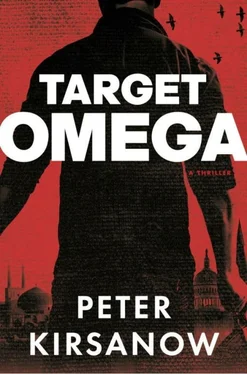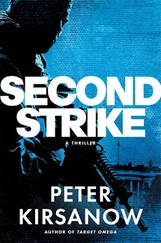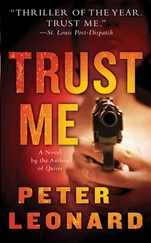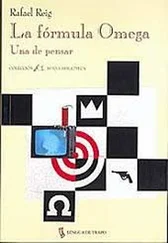Dwyer displayed a shot of Day for Garin, who squinted at the image.
“What am I looking at?”
“You’ll recognize the gentleman with his back to the camera, head turned slightly to the right, as His Self-Important Majesty, Julian Day, counsel to the Senate Select Committee on Intelligence. His dinner companion facing the camera, though resembling a well-dressed toad, is actually one Yevgeny Torzov, a member in good standing of the Russian diplomatic corps, currently attached to the embassy in Washington.”
“SVR?”
“We think so. Maybe FSB.”
“Any idea why Day would be meeting with him?”
Dwyer shrugged. “None. But whatever the reason, it’s peculiar, don’t you think?”
“No argument there,” Garin concurred.
“No coincidences in this business.”
“That phrase is starting to become the understatement of the decade.
“Why would Day be meeting with Torzov?” Garin asked, more to himself than to Dwyer.
Dwyer examined Garin’s face again. “You’re thinking about asking him, aren’t you? You hardheaded, stupid son of a bitch. Everybody but the third-shift janitor at the FBI is looking for you and you’re thinking about going to make a house call on the chief snapping turtle for the Senate Intelligence Committee, a turtle who, by the way, has hated your guts since before you were born. He hates the very idea of Mike Garin. In his mind, you’re the chief locus of evil in the world. You know that? He’d love to nail you to the wall. What the hell could you possibly accomplish?”
“Might frighten him a little.”
“Beautiful,” Dwyer said, flinging his arms in theatrical exasperation. “World’s going to hell and you want to make a detour to scare a one-hundred-fifty-five-pound lawyer. I’ll tell you what, that shouldn’t be a problem. As much as he hates you, he’s even more afraid of you. I’m pretty sure he wets his pants every time he hears your name.”
“Good to know.” Garin leveled his gaze at Dwyer. “Consider all the plausible reasons why Day would be meeting with Torzov in a very public place. The most plausible is…”
“Hiding in plain sight, obviously.”
“Right. And you hide in plain sight when you don’t want anyone to be suspicious about what your true motives are. He needs to present a façade of innocence because there’s something to hide, something that concerns Russia. At just the same time it appears the Russians are trying to crash DOD computers. Now, what are the odds he knows something, something important?”
Dwyer nodded. “About a hundred and ten percent.” A pause, then: “How do you plan on playing this?”
“I don’t have many options. When in doubt, the direct method is always best.”
“Geez, Mikey…”
Garin changed the subject. “Were you able to get anything from the Germans on Taras Bor?”
“What am I now, your personal assistant? Can I get you a hand towel? Maybe some mints?” Dwyer protested. “Yeah, as a matter of fact, I received a PDF file on our way here to meet you, but it’s pretty dense. Easier for you to view on a big screen. I’ll download it when I get back to Quantico and we can make arrangements to get you the information.”
“No need to go to all that trouble. I’ll just go with you to Quantico.”
“Great move. Outstanding move,” Dwyer said, rolling his eyes. “Quantico’s got two things, Mike. Just two things. Marines and FBI agents. Thousands of them. Nothing else. Not a friggin’ thing else. And you want us to drive you right into the middle of it. They catch you, that makes us accessories. Did you think about that?”
“Just hiding in plain sight.”
As Dwyer continued to protest, Garin leaned forward. “Matt?”
“On our way,” Matt said, grinning. “Just another ten minutes.”
VANCOUVER, BRITISH COLUMBIA
JULY 17 8:05 A.M. PDT
Ari Singer stared out of the twenty-first-floor window of his room in the Pan Pacific Hotel at the giant cruise ship docked in Vancouver Harbour. This, he thought, is tranquility. This is how life is supposed to be. No missiles. No suicide bombers. Just peace. Normality. Sanity.
Singer had preceded Mansur to Vancouver for reasons far removed from tranquility. At the outset of their relationship, the Iranian had made clear his aversion to communicating by phone or other electronic devices, regardless of how secure such devices purported to be. Mansur insisted that any substantive communication be conducted face-to-face. He would use the phone only to utter prearranged signals — usually consisting of no more than one or two innocuous words — that would alert Singer to a meeting time or place.
Singer didn’t object to Mansur’s refusal to use phones. The old intelligence operative hadn’t remained alive by being reckless. The Iranian wasn’t only cunning; he knew his country. The regime monitored everything. It suspected everyone. A single misstep meant not merely prison, but torture and death.
Approximately twenty-four hours ago, Mansur had called Singer and spoken a single, simple word that set off a silent alarm in the Israeli’s brain: “Terminal.” The signal conveyed two things: the seriousness of the situation and the action to be taken. It meant that Mansur’s life — and, therefore, Singer’s — was in jeopardy. A lie had unraveled, a cover had been blown, or a body had surfaced.
Both men had to leave Iran immediately. Do not finish your dinner. Do not pack your clothes. Get out on the fastest conveyance you can find.
The preselected destination in which Mansur and Singer were to meet was Vancouver. It was Mansur’s choice. He had never been there but he’d seen videos of the city, fallen in love with it, and pronounced it the place where he would spend the rest of his days if he couldn’t do so in Iran. Singer thought the selection a bit impetuous and quirky. Perfect for a man who had spent his entire life being deliberate and methodical.
Singer was unsure when Mansur would arrive in Vancouver, but upon his arrival he would get a message to Singer at his hotel. The Israeli turned from the window and poured a cup of tea from the pot delivered by room service a short time ago. He sipped slowly and decided to try to contact his friend in the United States again.
Singer sat at the small desk next to the window, powered on a laptop, and typed in an e-mail address. A few keystrokes later, he hit send. He had sent several other messages in the last two days but had received no replies. That wasn’t unusual. The addressee was a busy man. But he was also a conscientious and diligent man. He would reply, eventually. Singer just hoped it would be sooner rather than later.
—
Matt turned off Jefferson Davis Highway and drove the SUV about a quarter mile along a narrow drive and down the entrance ramp to the underground parking facility of DGT’s Quantico facility — a black, two-story, glass, steel, and granite building situated on fifteen wooded acres a short distance south of the Marine base. At the bottom of the ramp, two guards in black uniforms and body armor, MP5s slung across their chests, stood adjacent to a steel lift gate that spanned a tire shredder beneath. The guards knew the SUV on sight but raised their weapons to their shoulders, tracking the vehicle as it descended the ramp.
Matt brought the SUV to a halt in front of the lift gate as a third guard, carrying an inspection mirror and accompanied by an all-black Belgian shepherd, emerged from a kiosk next to the lift gate and inspected the perimeter of the vehicle as well as its chassis. Matt lowered all four of the SUV’s opaque windows and the guards peered inside. The guard at the driver’s-side door nodded in acknowledgment toward Matt and Dwyer. Turning his gaze to the man seated next to Dwyer, the guard’s jaw slackened slightly in recognition.
Читать дальше












